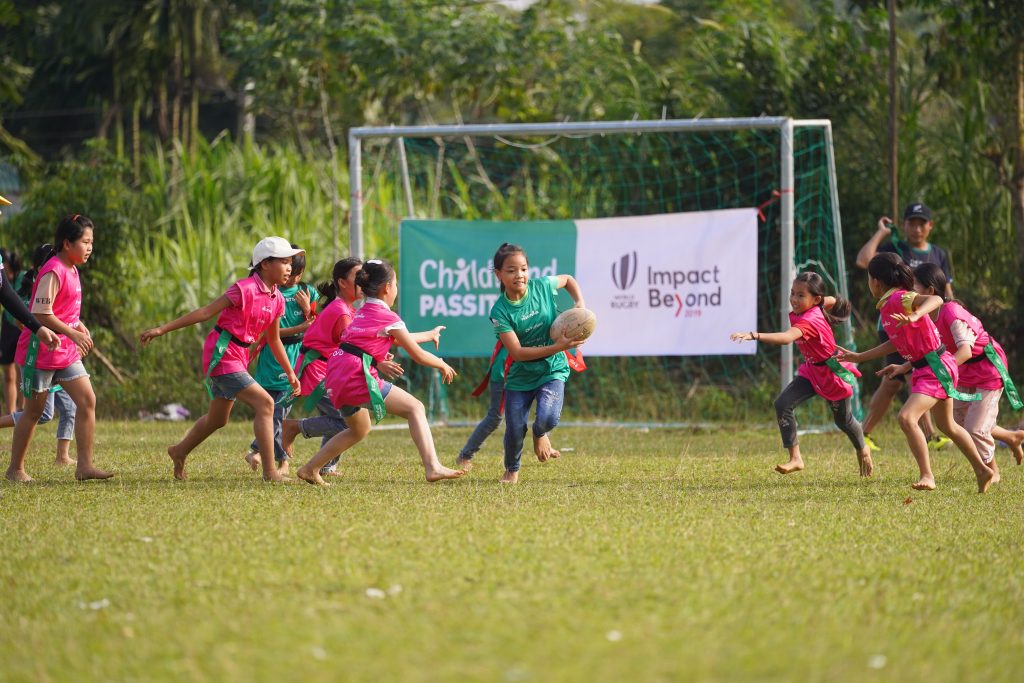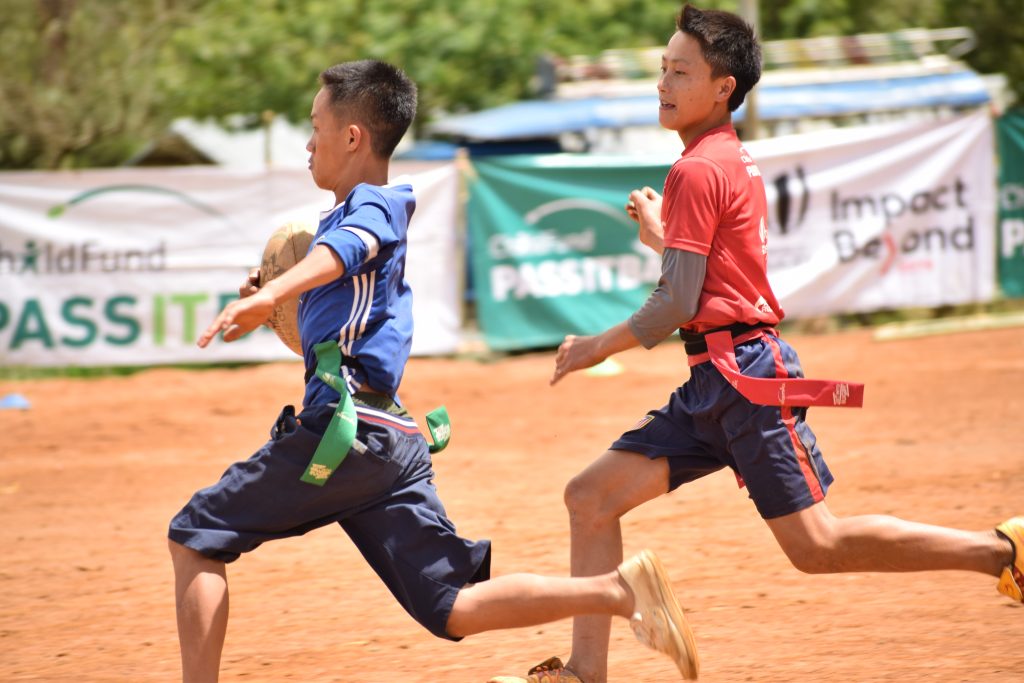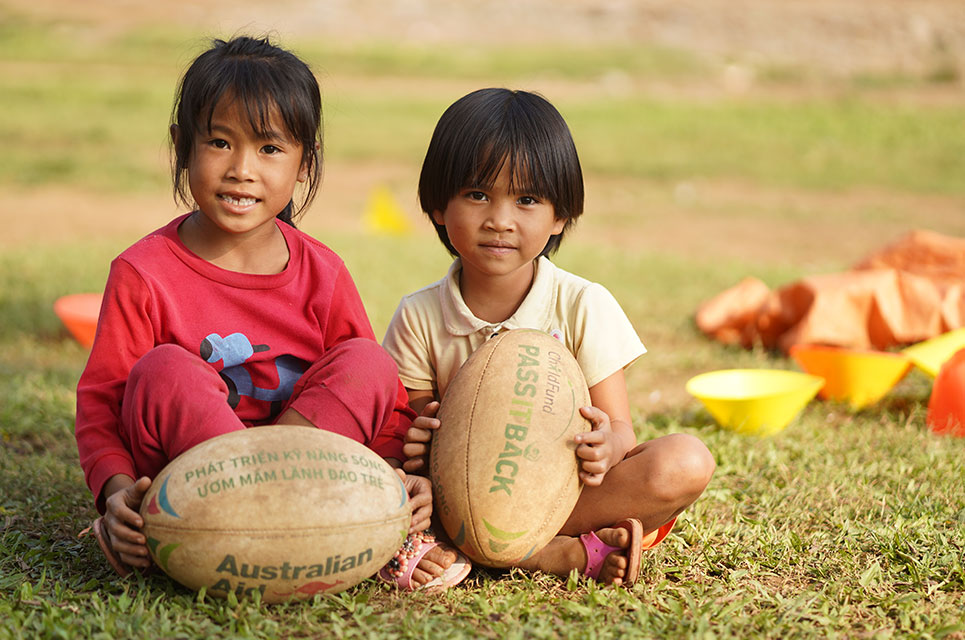Your basket is currently empty.
Reconnect is a COVID-19 early recovery rugby and life skills curriculum developed by ChildFund, delivered by our rugby partners.
In February 2021, a Reconnect Impact Report was released to evaluate the impact of activities. This will support our learning, as more and more countries move back to modified face-to-face activities in 2021-2022.
In this article, we look at how ChildFund Rugby responded to the challenges of COVID to keep the legacy of Rugby World Cup 2019 alive, even during the most challenging of times, with a focus on Laos and Vietnam.

How did Rugby World Cup 2019 Impact Pass It Back?
The biggest impact of the successful Rugby World Cup 2019 partnership between World Rugby and ChildFund came from the global rugby community who were able to see the power of the rugby to create community change through Pass It Back.
The partnership supported World Rugby by bringing more players and Coaches into the game and supported ChildFund to deliver important leadership and life skills learning for children and youth across the region, through rugby partners.
The generosity of the global rugby family also saw a record two million GBP pledged to support Pass It Back across Asia. This support allowed activities to not only scale-up prior to COVID – supporting the delivery of more than 40,000 rugby and life skills sessions – but also to respond when the COVID pandemic hit in early 2020.
What is Reconnect?
In Laos and Vietnam, Pass It Back activities were suspended in 2020 due to the COVID-19 global pandemic with public health measures preventing the delivery of face-to-face activities. In response, the ChildFund Rugby team developed a COVID-19 pivot curriculum, called Reconnect.
The curriculum’s aims were to provide opportunities for children to reconnect through sport, learn and to get out to play and move after lockdowns.
It was also designed to be more flexible than Pass It Back, allowing children to drop-in as available, as conditions closed or opened, depending on public health measures and their family’s circumstances.
The online training of a group of more than 100 community-based Coaches, already in place through Pass It Back, started in May 2020, ensuring they were familiar with the new curriculum and tools, and to ensure that Coaches delivered strong social and emotional learning (SEL) opportunities.
The Reconnect curriculum was delivered in 2 stages:
- Reconnect Rapid: Provided children and young people with opportunities to access sport and learning activities in a safe setting that offered a drop-in facility as communities adjusted to a rapidly changing environment.
- Reconnect Teams: Provided children and young people with more structured opportunities to access sport and learning activities in a safe environment, with a focus on setting goals in times of uncertainty.
More information is available on the ChildFund Rugby website.
What are the Key Learnings from Reconnect?
The Reconnect experience unearthed some key findings:
- Community-based Coaches can deploy quickly and effectively (such as in a crisis situation): Rugby partners and their Coaches mobilised, engaged authorities and began delivering content in Laos and Vietnam within 3 weeks of restrictions starting to be lifted.
- Coaches can transfer their knowledge and skills to pivot and deliver new content: The expertise that has been developed among the coaching group through Pass It Back enabled effective implementation of new content and protocols designed for COVID-19 response and recovery.
- Coaches can deliver high-quality SEL outcomes for children in the communities where they live: Curriculum flexibility has been key to learning and the inclusion of important hygiene and health information provided a service valued by communities.
Khingkham, a female player from Laos who took part in Reconnect, said: “My Coach showed me how to think about what goals I want to achieve and set them out on paper. My goal is to become a Lao national player, but I need to work hard and try to improve myself and be a good role model to my friends.”

Reconnect’s Key Achievements
As a result of Reconnect’s implementation, between May and December 2020, 160 Coaches (59% female) delivered two cycles of Reconnect Rapid and two rounds of Reconnect Teams.
This equates to a remarkable:
- 13,598 sessions
- 8 competitions
- 8,998 players benefitting (57% female)
The success of the curriculum is shown in both the evidence collected and the reflections of player and coaches. Sessions provided players time to share some of their worries and stresses with Coaches and peers during the pandemic. Players were also keen to be involved and expressed a sense of enjoyment and safety at each session.
Coaches supported players and their communities by providing opportunities for physical activities and social interaction (while adhering to relevant government regulations at all times) and provided important life skill learning opportunities, including access to critical hygiene information.
Vietnamese Coach Nhat said of a young female player: “Trang now also shares her opinions during the life skills sessions. In the past, she might have had opinions, but she just did not speak up. Now that she has gained more confidence and courage, she shares her opinions with her teammates.”
Read more about Hien’s experience as Pass It Back Coach in Vietnam. She is a Coach, who was trained to deliver Reconnect.
Social and Emotional Learning Benefits
By setting goals, creating plans and supporting one another to achieve them, players participating in Reconnect were able to find ways to overcome feelings of helplessness or frustration brought on by the COVID-19 situation. This is an important area of wellbeing often overlooked, as the wider impacts of COVID-19 on young people are being better understood.
Other positive behaviour improvements included: encouraging teammates during rugby activities and life skills discussions.
The players’ overall social and emotional competency learning improved across Reconnect and reinforced the importance of reaching out for help when needed.
Players also continue to have access to a reliable source of information on how to stay safe and healthy, which they could share with their communities.

